Become a
LEADER OF THE FUTURE
in Computer Science and
CYBERSECURITY
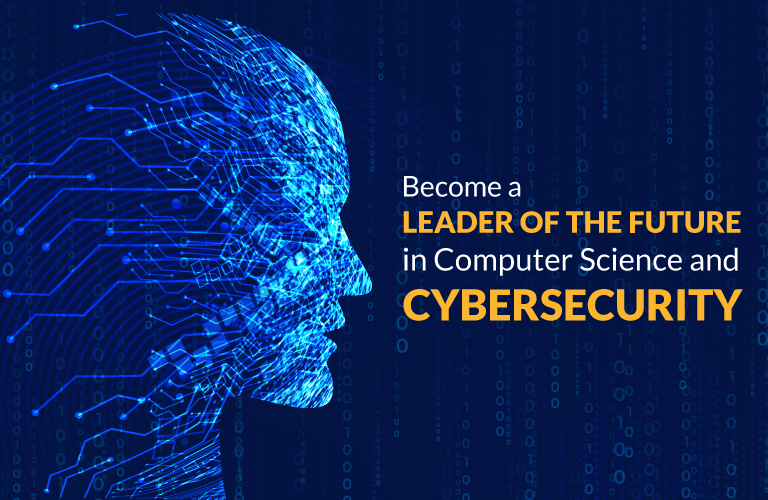

"*" indicates required fields
EC-Council University’s (ECCU) Master of Science in Computer Science (MCS) degree program is a relevant and expanding program in the competitive field of computing and technology. The field of computer science involves continuous technological evolution, which opens up great professional development and advancement opportunities. The program is curated to provide you with hands-on experience and knowledge application into a wide variety of computing topics to help you move forward on the path of career development.
The Master of Science in Computer Science (MCS) Degree Program prepares graduates to be strong leaders and industry experts in computer science related fields. This program provides students with hands-on experience, allowing them to gain and apply knowledge in a wide variety of computing topics and to prepare for a range of technology leadership roles. The program’s comprehensive curriculum and multidisciplinary approach ensure that students master computing theory and technology. Graduates are prepared to leverage the knowledge gained from this program to lead the innovative integration of computer technologies into their organizations.

Graduate

18-24 months

12

July 7, 2025

Certified Ethical Hacker (CEH)
Certified Network Defender (CND)

EC-Council University provides students a 360-degree view of real-world and industry-related concepts by offering:

Career-focused, Industry-ready courses

High-impact skills to keep you industry ready

Deep-rooted knowledge in the computer science domain

Trends and best practices in computer science, cybersecurity, and leadership

Collaboration with industry experts

Globally accepted instructional methods
ECCU’s Master of Science in Computer Science coursework is entirely online and asynchronous, offering students the flexibility to attend classes from anywhere across the globe and at the most convenient time.
The program curriculum is a myriad blend of theoretical components and practical lessons to ensure that our graduates are industry-ready. The terms are well-structured, submissions pre-defined, and weekly attendance and participation mandatory.
The courses are wholesome and include discussion threads, quizzes, assignments, videos, ilabs (ECCU’s online virtual platform to practice), assessments, and Cyber Talks to support our students’ learning and better prepare them for real-time challenges and opportunities.
Each course is instructor-led by credentialed professors with industry experience, with a maximum enrollment of thirty (30) students. The professors interact, engage, assist, support, and offer guided learning experiences to the students.




Due to the changing technological landscape and the increased risks associated with this change, organizations now need to make cybersecurity a priority in order to protect their data, networks, and digital structure so they can remain functional and productive.

Courses

Semester Credits

Years






Whether you are a beginner or an expert, iLabs is built for you and is entirely customizable to your needs. No experience necessary.
Practical hands-on learning provides access to real-world tools and scenarios, boosts knowledge retention, and is proven to be more effective at preparing you for the job.
Technology is taking the world by storm, and Artificial Intelligence, Robotics, and Blockchain are proving to be the agents of ascension. Technological advancements transcend conventional computer-based machines and enable cameras, sensors, and robotic devices. This digital revolution can be attributed to the ever-expanding scope of technology. As the futuristic milestones of technological progression, Artificial Intelligence, Robotics, and Blockchain are fast being established as part of our day-to-day lives, accounting for a lucrative job market.
These increasingly sophisticated technologies are expected to amplify the consumer demand. The data revealed by the U.S. Bureau of Labor Statistics reflects these technologies taking on a stronger role in network and systems security.
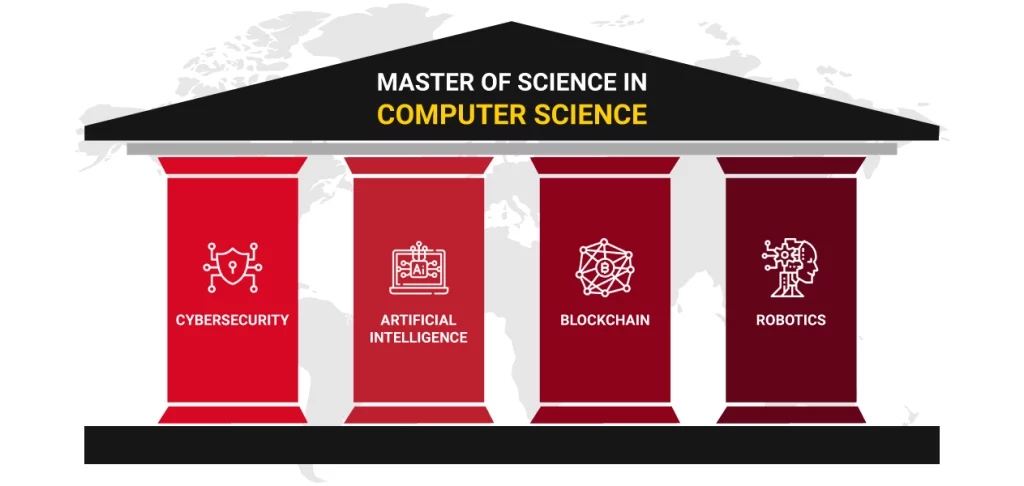


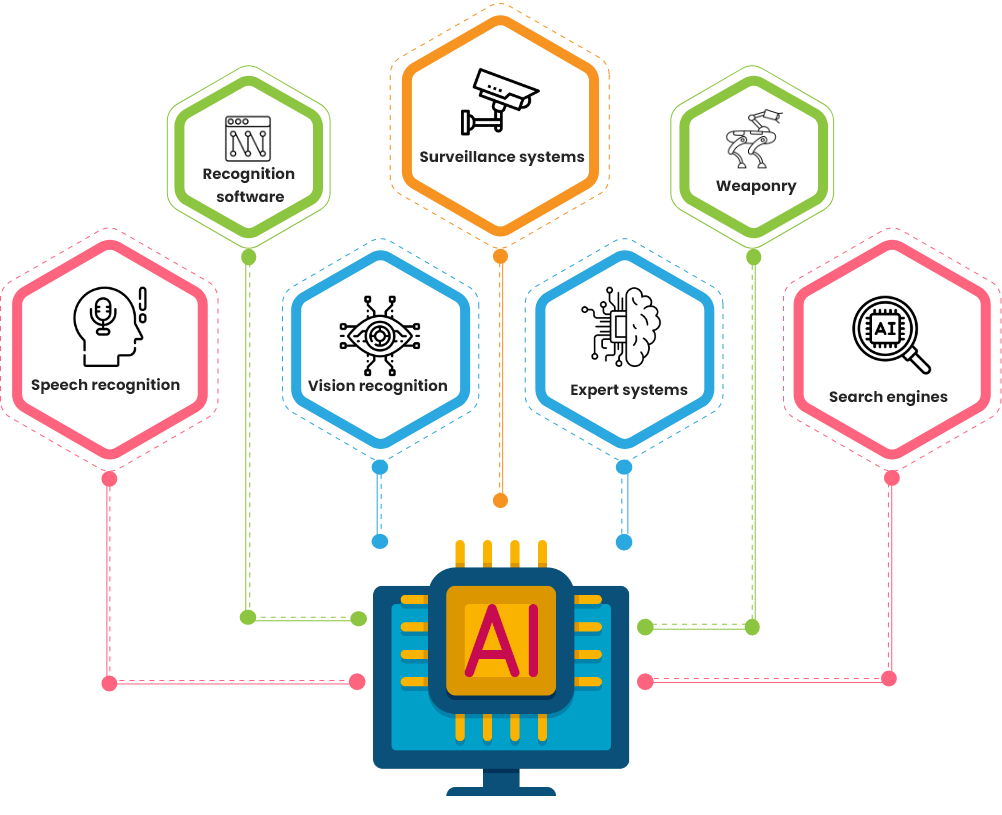
The MCS degree program aims at teaching the essentials of Robotics. Woven into this program are concepts related to robot operating systems (ROS), navigation, planning, python for robotics, and the fundamentals of Linux. Students learn how to design robots, control their behavior, and understand their use as they study the core disciplines of computer science.
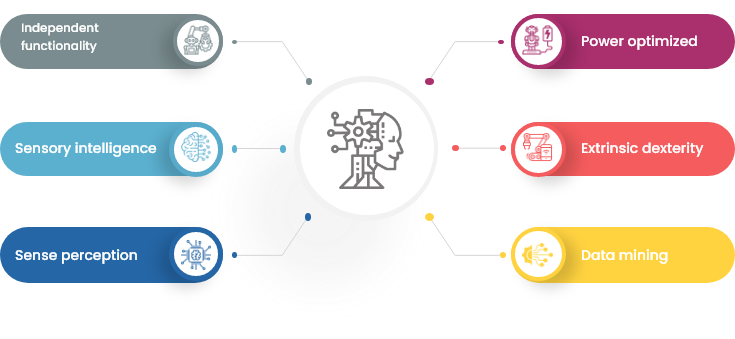
The MCS degree program equips students with the fundamental knowledge of Blockchain technology. Rooted in concepts of cryptocurrency, smart contracts, and other applications, students will learn all of the essentials of blockchain technology and how to utilize these new capabilities in various applications.

Wherever you are in your career, ECCU has the best MCS program to help you reach the next step in your professional journey. Our cutting-edge curriculum will empower you to be the next leader in your field and help you to develop the skills necessary to advance. Our Master of Science in Computer Science degree offers students the opportunity to cultivate abilities required to rise to any technology leadership position across a broad range of industries.
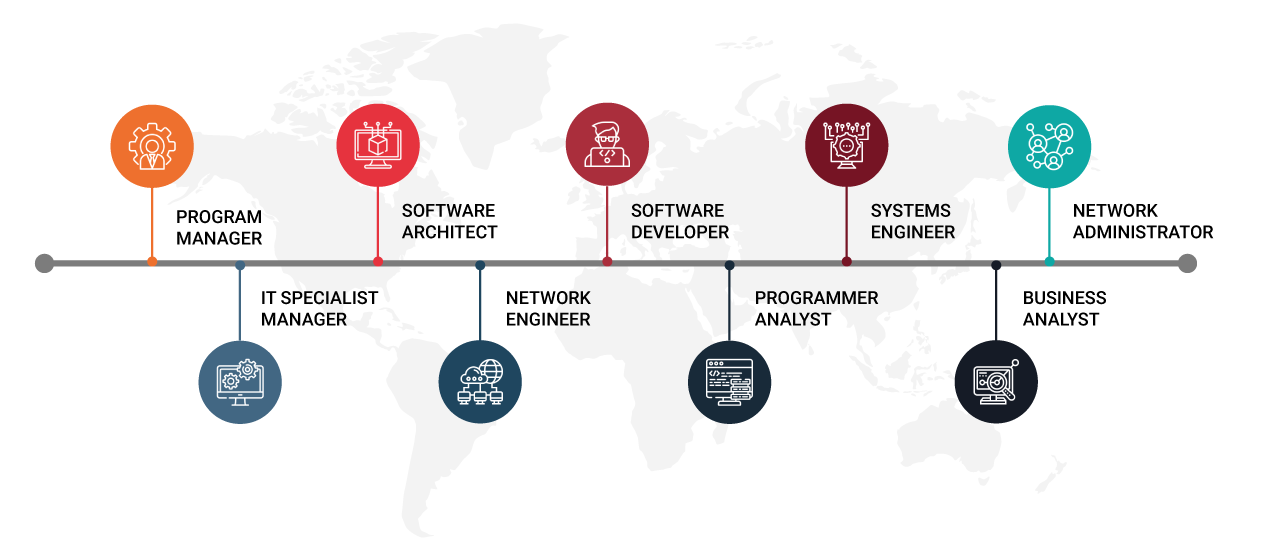

New jobs

(median annual wage in May 2021)

(median annual wage in 2022)
Applicants for admission must have a Bachelor’s degree from an accredited institution and a TOEFL score of 550 or better (or proof of English competency) and the following:
For more information about admission requirements, please visit our Admission page.
EC-Council University will award the Master of Science in Computer Science with Cybersecurity specialization upon successful completion of all degree requirements. In addition to the specific degree requirements, each candidate for graduation must meet the following requirements:
Tuition and Fees |
|
$540 /Per Credit Hour |
| Application Fee: $65 (One-Time Fee) |
| Technology Fee: $50 per term |
| Lab Fee: $50 per certification course |
| Graduation Fee: $400 (One-Time Fee) |
| Transcript fee: $15+ shipping** |
| Transcript w/Apostille: $35+ shipping** |
**Students must have all financial obligations met prior to transcripts being released.
ECCU reserves the right to withhold transcripts and other similar documents when students, for example, have unmet obligations to ECCU.
The Master of Science in Computer Science from ECCU spans 36 credit hours over two years.
The Master of Science in Computer Science program has its own stipulated requirements for acceptance. The incumbent must have a bachelor’s degree from an accredited U.S. institution or its international equivalent and likely already employed in technology fields. A work experience of two to three years in the domain of technology is preferred.
This master’s degree in computer science combines industry-specific technical expertise in the wide domain of computer sciences, along with a high standard of professional and ethical behavior in all professional activities. The students will learn to analyze, design, program, test, and implement computer systems using effective practices in computer science, communicating current industry trends, and staying abreast of them.
We, at ECCU, evaluate students throughout the program through discussion threads, required attendance, completion of assignments, lab assessments and reports, final examination, and the Capstone course. ECCU’s Capstone course serves as a comprehensive assessment of knowledge and skills in technology and management. Activities include researching selected technical problems and planning, designing, implementing security solutions for a user organization, and testing every ounce of what the student has learned.
This online master’s in computer science degree will teach you the application of technology, tools, and strategies that are directly tied to the field of computer science, thereby enhancing your knowledge and skills in the professional arena. It will also teach you about global competitive environments so that you know how to incorporate best practices in computing to improve operations.
The M.S. in Computer Science program at EC-Council University comes packaged with two valuable and industry-recognized certifications, Certified Network Defender (CND), Certified Ethical Hacker (CEH). The master’s degree, of course, has a broader coverage of topics and provides a deeper insight into the specialized areas of expertise that these certifications offer.
Applicants for admission must have a Bachelor’s degree from an accredited institution and a TOEFL score of 550 or better (or proof of English competency) and the following:
Student Enrollment Application
Official government ID or passport (international students)
A photo of yourself holding your official government ID
Official transcript(s) from the institution where the student received bachelor’s degree or most recent master’s degree
An official evaluation of international credits (for students with international transcripts only)
Proof of English proficiency (international students only; see the section on English Requirement for International Students)
Application fee
EC-Council University (ECCU) provides direct tuition assistance through the provision of following scholarships:
Associate’s Cybersecurity Scholarship – This is a need-based scholarship, designed to provide continuing education tuition assistance to undergraduate students who have graduated from a U.S. college with an earned associate’s degree. The award will be a one-time scholarship of up to $2,000 to continue your education in ECCU’s Bachelor of Science in Cybersecurity program.
The President’s Choice Scholarship for Women – EC-Council University is dedicated to bringing women’s minds together by providing tuition assistance for women pursuing undergraduate and graduate studies in cybersecurity. A one-time scholarship of up to $2,000 may be awarded to women recognized by EC-Council University.
The Cybersecurity Dean’s Scholarship – This is a need-based scholarship. The award will be continuous through the program of study in a scholarship amount of 10% of tuition for selected applicants.
New Mexico Scholarship – This is once again is a need-based scholarship, designed for students that are current residents of the state of New Mexico. The award will be continuous through the program of study in a scholarship amount of 10%.
Heroes Scholarship – This, too, is a need-based scholarship for students who are either on active duty in the U.S. military or are military veterans or first responders. It also applies to military personnel and first responders of other countries. The award will be continuous through the program of study in a scholarship amount of 10% of tuition for selected applicants.
The fee structure of this program includes expenses under these heads: Application fees: $35 (one time), Technology Fee: $50 per term, Graduation Fee: $200 (One time) Transcript Fee: $10 + Shipping, iLabs Fee: $200, Specialization: Security Analyst Fee: $1200. The fee structure also includes specialization fees and the course fee per credit hour is $540.
Aspiring students who have met the following conditions are eligible to apply for the master’s degree in computer science:
Have earned their bachelor’s degree or foreign equivalent from an appropriately accredited institution that is listed in the International Handbook of Universities, accredited by an agency recognized by the U.S. Secretary of Education, and/or the Council for Higher Education Accreditation (CHEA).
Have a Proof of English proficiency (international Students only; see the section on English Requirement for International Students here https://www.eccu.edu/student-services/admission/)
Upon the successful completion of the Master of Science in Computer Sciences, you will be able to master the skills necessary to move into leadership roles in companies, agencies, divisions, and departments. It will lead you to multitude of career opportunities including:
Information Security Auditor
Information Security Manager/Specialist
Risk/Vulnerability Analyst/Manager
Information Security Analyst
Security Architect
Computer Network Defender
Cybersecurity Defense Analyst
Information Security (I.S.) Director
Tuition and Fees |
$540 /Per Credit Hour |
| Application Fee: $65 (One-Time Fee) |
| Technology Fee: $50 per term |
| Lab Fee: $50 per certification course |
| Graduation Fee: $400 (One-Time Fee) |
| Transcript fee: $15+ shipping** |
| Transcript w/Apostille: $35+ shipping** |
APPLICATION DEADLINE
July 7, 2025
Intake Start From
July 7, 2025
Start Your Online Application
EC-Council University is a premier institution of higher learning that specializes in cybersecurity technologies, enabling its graduates to obtain advanced cyber skillsets. Our unique program allows our graduates to lead their peers to strategically and effectively manage cybersecurity risks in their organizations.
EC-Council University is dedicated to creating superior educational programs that equip graduates to face the latest IT security risks and lead their colleagues in strategically handling those challenges. EC-Council University builds on the recognition and strengths of its parent corporation, The International Council of Electronic Commerce Consultants (also known as EC-Council), a globally recognized IT certification body specializing in Information Assurance and e-business.
Founded in 2003 by the Former School President, Mr. Sanjay Bavisi, EC-Council University (ECCU) is headquartered in Albuquerque, New Mexico. Albuquerque is a charming community nestled in the Sandia Mountains. Full of diverse culture and rich traditions, it is in the heart of the Southwestern United States, with a population of nearly 1 million people.
"*" indicates required fields